Iran central bank chief blames foreign psy-ops for currency freefall
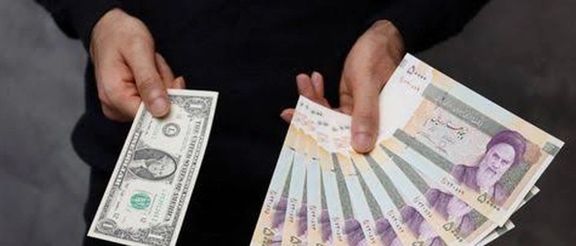
Iran's Central Bank chief Mohammadreza Farzin blames 'psychological operations' abroad for the sharp decline of the country's currency.

Iran's Central Bank chief Mohammadreza Farzin blames 'psychological operations' abroad for the sharp decline of the country's currency.
"They published a negative story every few hours," Farzin asserted, referring to US outlets that he said systematically derail his measures.
The Iranian rial plunged to a historic low against the US dollar on Wednesday, exceeding 780,000 rials per dollar. This marks a nearly 50% decline in the currency's value over the past year.
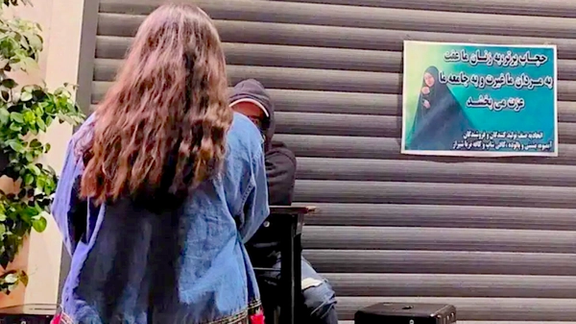
Supreme Leader Ali Khamenei urged Iranian women to resist foreign influence, warning that enemies use soft tactics to incite riots under the pretext of defending women’s rights.
“Everyone, especially women, should be vigilant about the enemy’s soft tactics and not be deceived by slogans and temptations,” Khamenei said in a meeting with a group of women on Tuesday.
"They label it as defending women, advocating for women's rights, or supporting a group of women," he added, pointing to the 'Woman, Life, Freedom' movement. "Yet, under the pretext of defending a single woman, they incite unrest in the country."
The 2022 Woman, Life, Freedom movement began after the death of 22-year-old Mahsa Amini in police custody. The ensuing crackdown, which led to the deaths of at least 550 protesters, was described as a crime against humanity by a UN fact-finding mission.
In his first public statements following the uprising in 2022, Khamenei said the protests had been engineered by Iran's enemies and their allies.
As the hijab war continues, the government has now officially postponed the implementation of the latest and most controversial hijab law, which imposes severe penalties on women and girls who defy veiling requirements, following widespread backlash from the public and international community.
Iran's Supreme National Security Council, in a letter to parliament on Saturday, requested that the implementation of the Hijab and Chastity law be halted. A member of the parliament's presiding board stated that this delay is to allow the government to submit an amended version of the bill for parliamentary review.
Last week, Amnesty International condemned the new law, stating that it intensifies the oppression of women and girls while exposing activists opposing the rules to charges that carry the death penalty.
Amnesty noted that the law, drafted in May 2023, less than a year after the Woman, Life, Freedom uprising, was introduced in response to widespread defiance of compulsory veiling by women and girls.
Iran-backed forces will endure - Khamenei
In his speech, Khamenei emphasized that Tehran's armed groups in the region, including Hamas and Hezbollah, remain strong despite significant challenges posed by external forces.
Addressing the situations in Gaza, Lebanon, and Syria, Khamenei condemned the actions of the United States and Israel, calling their assumption that resistance would end a grave miscalculation.
"They thought resistance was over," Khamenei said. "They are gravely mistaken. The spirit of Seyyed Hassan Nasrallah is alive; the spirit of Sinwar is alive. Their martyrdom has not removed them from existence. Their path continues."
Khamenei dismissed Israel's military operations in Syria, warning that its efforts to encircle and eliminate Hezbollah forces would ultimately fail. "The one who will be uprooted is Israel," he said.
While Israel maintains that it has no interest in conflict with Syria and rarely comments on specific strikes, it has carried out a series of operations targeting weapons facilities and military infrastructure. Since the fall of President Bashar al-Assad, Israel has intensified strikes against military installations across the country.
On Monday, multiple large explosions rocked Syria's coastal areas — home to Russian and pro-Assad military bases, according to the Syrian Observatory for Human Rights.
Israel also maintains troop presence inside the buffer zone and beyond, citing efforts to prevent a repeat of the October 7 attacks, in which Iran-backed Hamas infiltrated Israeli territory, killing over 1,100 people and taking more than 250 hostages.
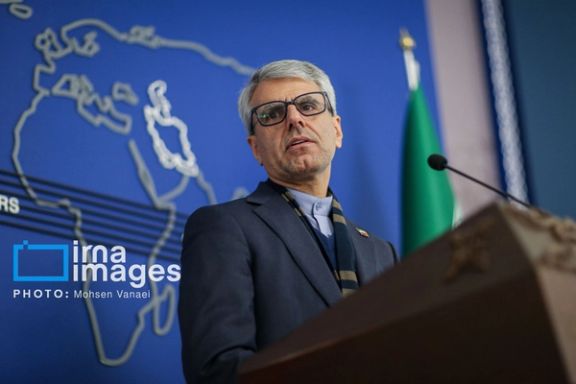
Iran will reopen its embassy in Syria, which was stormed by militants following the fall of Damascus, but the matter is not imminent until the staff's security is ensured, Foreign Ministry spokesperson Esmaeil Baghaei said on Tuesday.
“I prefer not to use the word ‘imminent'," he said. "This is on the agenda, and as soon as the necessary conditions are met—both in terms of security and politics—we will move forward with reopening the embassy."
Video footage shared on the day President Bashar al-Assad fled to Moscow showed militants in the embassy, ransacking documents and vandalizing the facility, with shattered glass and broken furniture seen around the building. Iranian media reported that the staff had fled before it was taken over.
Addressing comments made on Monday by the EU foreign policy chief, Kaja Kallas, that Iran and Russia should have no role in Syria's future, Baghaei said: “This is an interesting joke, and I think when she made this comment, she was probably reading history books. The era when foreign powers could dictate to other regions is over.”
Explaining Iran's role in Syria, Baghaei said: “Our presence in Syria was fundamental and principled, and our withdrawal was responsible. We were not seeking expansionism, dominance, or the revival of past empires. What mattered to us in Syria was helping ensure its security in the fight against terrorism.”
Syria, under Assad, was a key component of Iran’s so-called 'Axis of Resistance,' serving as a vital land corridor for supplying weapons and materiel to Hezbollah in Lebanon. Over the years, Israel sought to disrupt this supply line through hundreds of airstrikes.
During the briefing, he also addressed remarks made by several Iranian politicians that Assad government owes approximately $30 to $50 billion to Iran.
He said the number were exaggerated, saying that the debts will be transferred to Syria's new political system based on the principle of state succession. "These figures, such as the claim of a $50 billion debt owed to Iran by Syria, are truly very exaggerated."
As Iran looks to its future after a battered Syria, Iranian President Masoud Pezeshkian will attend the D-8 summit in Egypt, the spokesman confirmed on Tuesday. The summit of the eight major Muslim developing countries, known as the D-8 Organization for Economic Cooperation, will be held on Thursday.
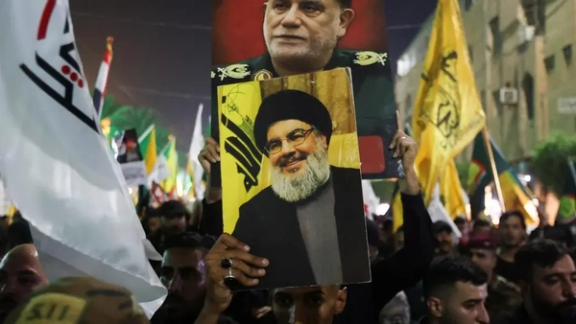
One of Iraq's few independent newspapers has warned that the country may share Syria's fate of prolonged conflict and upheaval if the government fails to distance itself from the Islamic Republic and undertake urgent reforms.
This news analysis comes after Bashar al-Assad in Syria lost his grip on power after support from Iran and its ally Hezbollah were sapped by over a year of conflict with Israel.
Prime Minister Mohammed Shia' al-Sudani, whose tenure is supported in part by Iran-backed armed groups, may now face pressure to prioritize Iraq’s sovereignty over foreign influence according to the daily.
"Iraq remains internally divided over the repercussions of the situation in Syria, with some still supporting intervention at this point. Factions and some actors in the Shiite political scene align with this view, consistent with Tehran’s stance, which has announced the continuation of resistance," wrote Al-Mada.
The Committee to Protect Journalists has said Al-Mada "is seen as one of the only remaining critical newspapers in Iraq".
Operating under the umbrella of the Popular Mobilization Forces (PMF) and supported by the Islamic Revolutionary Guard Corps (IRGC), these groups wield considerable power over Iraq’s governance, military operations, and energy infrastructure.
Despite their original mandate to combat ISIS, many of the militias have since expanded their activities, frequently targeting US forces and installations in Iraq with rockets and drones, and exacerbating tensions between Tehran and Washington.
The paper also highlighted fears of broader regional destabilization following the fall of Bashar al-Assad in Syria, a key ally of Iran.
"Political forces have started warning about scenarios similar to Syria’s situation if rapid internal reforms are not implemented," wrote Al-Mada, citing thinktanks advising Iraqi government to distance itself from the poor governance of the Shiite political forces that have held power since 2003.
Tehran’s armed affiliates in Iraq may be weakened by the developments in Syria. The Australian Arab Institute for Strategic Affairs recently warned that Baghdad faces a critical juncture: either curb the influence of Iran-backed militias or risk becoming a target for escalating Israeli and US military operations.
Adding to the uncertainty are concerns about the potential reactivation of ISIS sleeper cells given the security vacuum next door.
“Iraq is trying to maintain a somewhat balanced relationship with Washington and not align itself entirely with Tehran,” Rahim al-Aboudi, a senior official in the National Wisdom Movement, was quoted as saying.
Growing public discontent
Domestically, public anger toward Iran’s proxies has intensified in recent years, particularly after their violent suppression of 2019 anti-government protests which criticized Iranian influence.
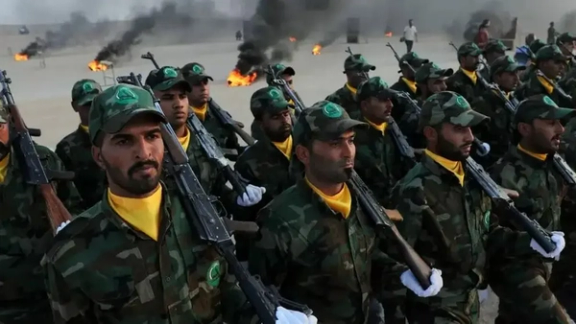
Social media has amplified these frustrations, with posts encouraging attacks on the Iranian embassy and measures to end the activities of armed groups backed by Tehran.
“Numerous individuals or fake accounts have called for citizens to arm themselves in opposition to Iran-backed forces,” Truske Sadeghi, a former Iran International correspondent posted on X.
The warnings of instability echo fears of a repeat of Iraq’s tumultuous recent past.
Unlike the ISIS incursions of 2014 which originated from Syria, analysts warn that any future unrest could arise from within Iraq’s cities, fueled by the same grievances that sparked the 2019 protests but on a potentially larger scale.
While Baghdad has reiterated that its borders are secure, the government’s inability to effectively manage the influence of IRGC-backed militias has left the country vulnerable to both domestic upheaval and regional spillovers.
As Iraq navigates mounting international and domestic pressures, its leadership could face a critical choice: assert greater control over Tehran-backed forces or risk a deeper descent into instability.
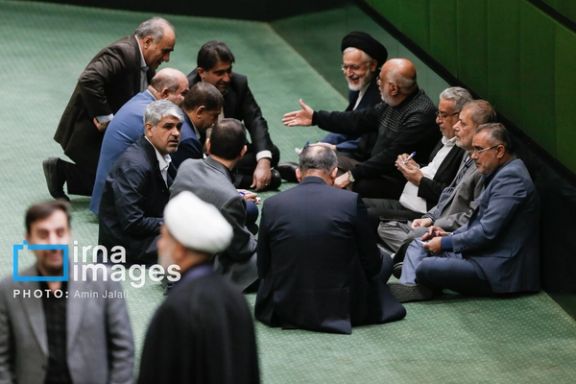
Recent regional setbacks have further weakened Iran’s hardliners at home, with increasing criticism from within the establishment holding them responsible for mismanagement and misdirection in the country’s foreign and domestic affairs.
Having lost Syria in a dramatic and unexpected turn of events, Iran’s hardliners find themselves with little to defend their position. They have shifted their focus to heavily campaigning for the implementation of a restrictive new hijab law, while attempting to deflect blame for the insurgents' victory onto their long-time ally Assad. Some hardliners argue that Assad lacked sufficient commitment to Tehran’s “axis of resistance,” yet they struggle to explain why the Revolutionary Guard did not make greater efforts to defend him.
Supreme Leader Ali Khamenei attempted to address the issue on December 11, claiming that the United States and Israel had blocked all land and air routes to Syria. However, this explanation was widely viewed as unconvincing, particularly given Tehran’s long-standing boasts of regional supremacy.
On Saturday, the country’s national security council decided to shelve the hijab law, bowing to public opposition as well as criticism from numerous current and former officials, along with commentators permitted to speak through tightly-controlled media channels.
Despite this, hardliner Foad Izadi sparked widespread backlash on social media and Iranian news websites by arguing that the insistence on hijab enforcement serves a political purpose for the Islamic government. He claimed that supporters of the political system expect religious laws to be taken seriously by officials, warning that failing to do so risks eroding the Islamic Republic’s base of loyal supporters.
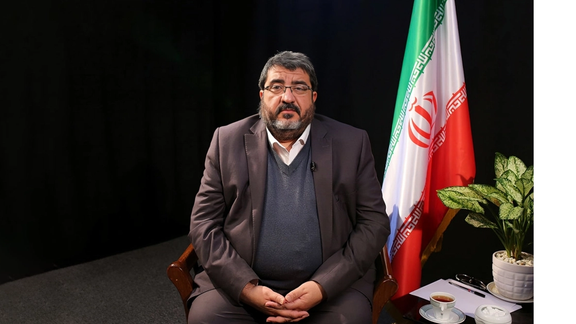
"The Islamic Republic does not see its benefit in giving in, because it believes the locomotive of the train it is riding on consists of a hard core of supporters who are loyal precisely because of these [policies]. If the Islamic Republic compromises on a few principles, this core of loyalists will be the first group to step off the train,” Izadi said during a video discussion published online.
Ironically, Izadi, who has become a staunch ideologue for Iran's hardliners, was educated in the United States from an early age and holds a PhD from the University of Louisiana. This apparent contradiction was not lost on a commentator from the reformist Aftab News website, who criticized Izadi for advocating hardline policies after benefiting from an education abroad.
Meanwhile, the relatively moderate Rouydad24 published a scathing article on Sunday targeting Izadi and his peers, accusing them of exploiting the hijab issue to tighten their control over the government. Matin Ghafarian, writing for Rouydad24, argued that these ultra-hardliners are not solely focused on enforcing stricter hijab regulations but are also intent on imposing broader counterproductive policies.
The article warned that such policies would further alienate the public, destabilize the Islamic government, and make it increasingly reliant on hardliner support. Rouydad24 wrote, "These individuals embody their own words—they are not easily satisfied. After making the establishment dependent on themselves, they begin to conquer the system step by step."
The website went even further, accusing ultra-hardliners of using political issues, such as the hijab, as a pretext to expand their influence for financial gain. By pressuring the government to adopt more extreme policies, they have exacerbated economic sanctions and deepened Iran’s isolation. This, in turn, has allowed them to leverage their influence to gain control over key economic sectors under the guise of rescuing the economy, often benefiting from government subsidies in the process.
Rouydad24 concluded, "The demands of this small group will not end until they have fully taken over the country’s economy. This group effectively traps the government in a cycle of decline—creating crises and feeding off them. In reality, we are not dealing with a fanatical and hotheaded group, but rather a cunning mafia intent on seizing control of all the country's economic resources."

Iran's vice-president announced that the administration is drafting a bill to amend the highly controversial hijab law, which the Parliament Speaker had promised would take effect on December 13.
“We will send an amendment bill to the Parliament to halt [the controversies over its implementation] now to conduct further investigations,” Deputy President in Parliamentary Affairs, Shahram Dabiri, announced Saturday.
Reformist media and politicians have extensively criticized the new hijab law, spearheaded by lawmakers of the Paydari (Steadfastness) Party and their allies in the parliament, notably the Jebhe-ye Sobh-e Iran (MASAF) that was established less than a year ago. Ultra-hardliners of the Parliament have the backing of the Constitutional Guardian Council whose approval is required for all legislation.
Both groups have close ties to the ultra-hardliner former nuclear negotiator Saeed Jalili who lost the recent presidential elections to Pezeshkian and a shadowy cleric, Ayatollah Mohammad-Mehdi Mirbagheri with an extremely radical interpretation of the Sharia.
More reformist clerics have criticized the law. “This law’s implementation is fraught with political and economic problems and [will result in] stirring up hate and aversion to religion … making it official means neglecting the country’s [serious] political, social, and cultural problems,” Ayatollah Mohammad-Ali Ayazi, a member of the reformist association of Qom Seminary clerics told the moderate conservative Khabar Online Saturday.
Ayazi also argued that ultra-hardliners’ insistence on immediate enforcement of tough hijab enforcement measures is meant to sabotage the Pezeshkian government’s efforts to remedy the more urgent problems it is grappling with. Ayatollah Ali-Akbar Masoudi Khomeini, another member of the same association, has expressed a similar view.
Despite agreeing with the hijab as a religious principle, several top-ranking clerics, including Ayatollah Abdollah Javadi Amoli, have criticized ultra-hardliners’ insistence on implementing the new law in loosely veiled terms.
“This law suggests that they [the government] want to lead people to paradise by force,” conservative cleric Mohsen Gharavian who has been an outspoken critic of the new hijab law told Khabar Online. “Maybe we don’t want to go to paradise. What should we do [if we don’t]?” he added.
On Saturday, the relatively independent Rouydad24 news website wrote: “It appears that [the delay resulted from] the administration’s negotiations [with higher entities] to postpone the implementation of the Act and make some amendments to it have been successful."
Rouydad24 added that authorities at the highest level may have agreed that the controversial legislation formulated by ultra-hardliners cannot be enforced in the current circumstances.